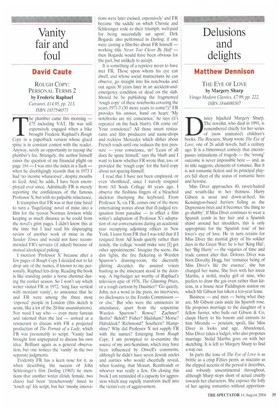Vanity fair and foul
David Caute
ROUGH COPY: PERSONAL TERMS 2 by Frederic Raphael Carcanet, f14.95, pp. 213, ISBN 185 7546571 The plumber came this morning — 05 including VAT. He was still expensively engaged when a bike brought Frederic Raphael's Rough Copy in a paperback version whose glued spine is in constant contest with the reader. Anyway, surely an opportunity to recoup the plumber's fee, Strangely, the author himself raises the question of my financial plight on page 164— I was into the index in a flash — when he disobligingly records that in 1973 I had no income whatsoever', despite mouths to feed. And, he adds, I have been unemployed ever since. Admittedly FR is merely reporting the confidences of the famous Professor X, but with no palpable reluctance.
It transpires that FR was at that time hired to turn a 'flagellating' novel of mine into a film for the tycoon Norman Jewison while keeping as much distance as he could from the novel's grim pages. I didn't know this at the time but I had read his disparaging review of another work of mine in the Sunday Times and would not have recommended FR's services (if asked) because of mutual ideological puking.
I mention 'Professor X' because after a few pages of Rough Copy I decided not to let drop any of the names, if known to me personally, Raphael lets drop. Reading the book is like standing under a horse chestnut during the conker season. So I won't say which writer visited FR in 1972. 'long face vertical with mordant vanity', to announce that he and FR were among the three most 'exposed' people in London (this sketch is acute, like a lot of the 20-line assassinations). Nor need I say who — even more famous and talented than the last — arrived at a restaurant to discuss with FR a projected production of The Portrait of a Lady, which FR was presumably to script. 'Vanity had brought him unprepared to discuss his own idea, Brilliant again as a general observation, but one notices the 'vanity' in the two separate judgments.
Evidently FR has a keen nose for it, as when describing the success of John Schlesinger's film Darling (1965) he mentions that another writer (Irish, female, two clues) had been 'treacherously' hired to 'touch up' his script, but her 'mushy innova
tions were later excised, expensively' and FR became 'the saddle on which Christie and Schlesinger rode to their triumph, well-paid for being successfully sat upon'. Dirk Bogarde also performed in Darling; if one were casting a film-bio about FR himself — working title Never Too Clever By Half — then Bogarde would have been obvious for the part, but unlikely to accept.
It is something of a reprieve never to have met FR. Those upon whom his eye can dwell, and whose social mannerisms he can observe, go straight into his notebooks and out again 30 years later in an accident-andemergency condition or dead on the slab. Should he be publishing the fragmented 'rough copy' of these notebooks covering the years 1971-3 (30 more years to come?)? FR provides his answer, hand on heart: 'My notebooks are my conscience,' he says (it's repeated on the back blurb). Oh come on Your conscience? All those smart restaurants and film producers and name-drops and reckless Mercedes which slither about French roads until one reduces the tyre pressure — your conscience, sir! 'Least of all does he spare himself,' says the blurb and I want to know whether FR wrote that, too, or provided the 'rough copy' for the hard copy about not sparing himself.
I read that I have not been employed, or even `shortlisted', since I naively resigned from All Souls College 40 years ago. I observe the fleshless fingers of a bleached skeleton thumping the keyboard. From Professor X, via FR, comes one of the more entertaining stories about that ill-judged resignation from paradise — in effect a film writer's adaptation of Professor X's adaptation of our conversations during an academic year occupying adjoining offices in New York. I learn from FR that I was told that if! resigned from All Souls quietly rather than noisily, the college 'would make sure [I] got other appointments'. Imagine the scene, the dim lights, the fire flickering in Warden Sparrow's drawing-room, the discreetly glinting decanter, the assured voices hushing as the miscreant stood in the doorway. A big-budget set worthy of Raphael's television epic of 1976, The Glittering Prizes, or a rough cartoon by Daumier? 'Go quietly, John, not a word in the press, no interviews, no disclosures to the Franks Commission — or else.' But who were the eminences in attendance, apart from the serpentine Warden Sparrow? Rowse? Zaehner? Berlin? Beloff? Fisher? Hailsham? Morse? Habakkuk? Richmond? Southern? Hampshire'? Why did Professor X not supply FR with the names? Emerging from Rough Copy, I am prompted to re-examine the source of my anti-Semitism, which may have been influenced by Orwell's comments, although he didn't have seven Jewish uncles and aunties who would cheerfully reveal, when feasting, that Mozart. Rembrandt or whoever was really a Jew. On closing this book I am reminded of a capacity for aggression which may rapidly transform itself into the victim's cry of aggrievement.


























































 Previous page
Previous page